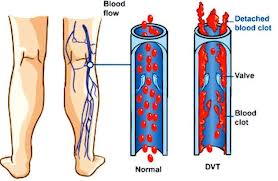[su_divider top=”no” style=”double” divider_color=”#952524″ link_color=”#952524″ size=”2″ margin=”10″]
What is DVT or Deep Vein Thrombosis? How to manage it? What are the precautions to be taken? What are the signs and symptoms? What is the cause of this disease? How to treat it? How can homeopathy help you? All of this answered, in this post and of course our doctors always there to help you. Just fill in your details in the form down below and we will answer all your questions for FREE!
[su_divider top=”no” style=”double” divider_color=”#952524″ link_color=”#952524″ size=”2″ margin=”10″]
[sc name=”query”]

What is Deep Vein Thrombosis / Venous Thrombosis?
Deep vein thrombosis is the formation of blood clot in one or more of the deep veins in the body. It mainly affects the large veins in the lower leg and thigh but can also occur elsewhere in the body including the arms. It can become a life-threatening situation when clots get broken and start traveling towards the heart, lungs or brain this is usually prevented by giving anticoagulant treatment or surgery in very
severe cases.
What are the causes of Deep Vein Thrombosis / Venous Thrombosis?
Causes of deep vein thrombosis
• Being over age above 60years.
• Prolong Bed rest/long hospital stay/paralysis.
• Cigarette smoking.
• A family history of blood clots.
• A pacemaker or a thin, flexible tube (catheter) in a vein.
• Fracture of pelvis or legs.
• Recent surgery/ injury to veins.
• Giving birth within the last 6 months
• Bone marrow makes too much blood cells (polycythemia vera) causing blood thicker than normal.
•Post-surgical complication.
• Inheriting a blood clotting disorder.
• Heart failure
• Cancer
• Inflammatory bowel disease.
• Obesity
• Birth control pills.
• Long period traveling like overseas flights, driving, etc.
What are the signs and symptoms of Deep Vein Thrombosis / Venous Thrombosis?
• Swelling and tenderness.
• Excessive pain due to clot formation.
• Blue colored bulge on affected site
• Changes in skin color in either leg.
• Veins firm with a thickened cord.
• Palpitation is also felt.
• Warmth feeling on affected site.
What investigations are advised on cases of Deep Vein Thrombosis / Venous Thrombosis?
• Complete case history
• Physical examination
• Venography
• CT or MRI scans
• D-dimer blood test
• Doppler ultrasound exams of legs.
• Antithrombin III level
• Lupus anticoagulants
• Protein C and S levels
• Plethysmography (measurement of blood flow)of legs
• A genetic test to look for mutations (such as prothrombin G20210A mutation) which can lead to blood clotting.
What is the prognosis of Deep Vein Thrombosis / Venous Thrombosis?
Deep vein thrombosis if the treated early prognosis is very good and in long-standing then surgery can relieve symptoms and one lead a better life.
What treatment is advised in Deep Vein Thrombosis / Venous Thrombosis?
• Heparin drug through a vein (IV).
• Anticoagulants (Blood Thinners)
• Analgesics
• Anti-inflammatory
• Diuretics
• Compression stockings
• Thrombolytic therapy
• Surgery: like balloon angioplasty, catheter-directed thrombolysis, stent insertion, thrombectomy, vena cava interruption.
What are the complications of Deep Vein Thrombosis / Venous Thrombosis?
• Pulmonary embolism
• Postphlebitic syndrome
What is the differential diagnosis of Deep Vein Thrombosis / Venous Thrombosis?
• Cellulitis
• Heart failure congestive
• Septic thrombophlebitis
• Superficial thrombophlebitis
• Budd-Chiari syndrome
• Baker Cyst
• Pulmonary embolus
What diet and management are advised in cases of Deep Vein Thrombosis / Venous Thrombosis?
• Elevate legs up to 6 inches while sleeping.
• Exercise lower calf muscles after doctor’s recommendation.
• Keep body hydrated with lots of water.
• Add lemon and ginger to diet to improve blood circulation.
• Broccoli is also considered to be one of the best food rich in fiber and good for the cardiovascular system.
• Use mustard oil, canola oil instead of high-fat cooking oil.
• Don’t sit idle for a long time, move legs on frequent intervals.
• Avoid food rich in vitamin K.
• Avoid drinking too much coffee or tea.
• Quit smoking.
• Weight management if overweight.
• Keep a close check on blood pressure.
• Wear compression stockings if advised by the doctor.
• Regular walking for a minimum of 20-30 minutes.
• Avoid consuming processed food and junk food.
• Avoid long duration flights.
• Don’t sit with an obstruction to the thigh muscles.
• Avoid doing risky things /sports which can cause bleeding.
What are commonly indicated Homeopathic remedies in Deep Vein Thrombosis / Venous Thrombosis?
Arnica Montana
Bothrops lanciolatus (lachesis lanciolatus)
Hamamelis virginiana
Lachesis mutus
For more information, you can visit NHS and MayoClinic.
Deep Vein Thrombosis
[su_divider divider_color=”#952524″ link_color=”#952524″ size=”2″ margin=”10″]
[sc name=”know-your-doctor”]
[sc name=”more-links-diseases”]

